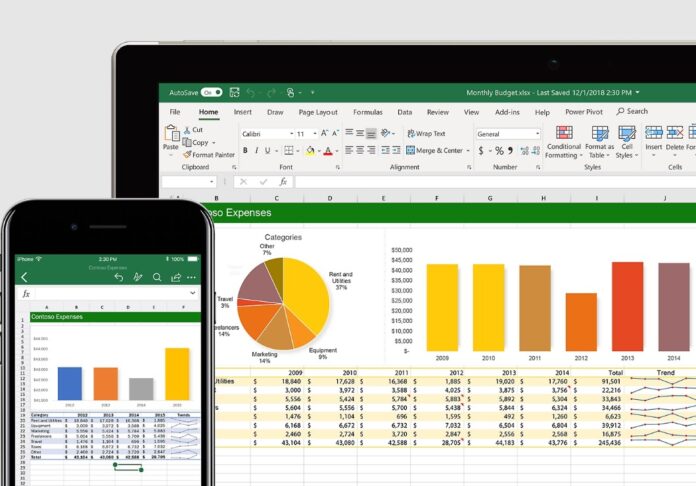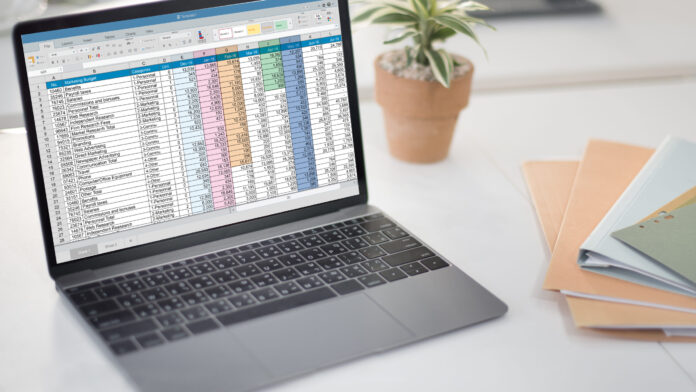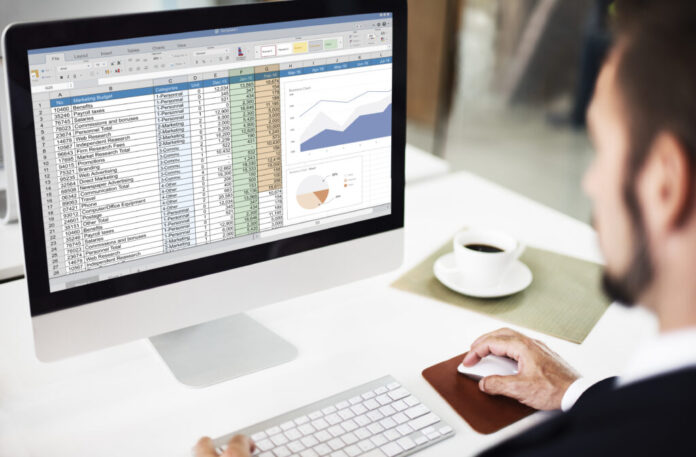
Spreadsheet programs are still commonly used by several businesses to manage business data. Spreadsheets are not as powerful as their alternatives, like SQL and Python; however, many users still prefer spreadsheets because they are easily accessible and a good tool for data analysis.
The importance of spreadsheets in business management is undeniable. It is versatile and can process data sets. Also, spreadsheets can present data in an organized manner and help with decision-making.
Excel spreadsheets are common knowledge, and many businesses prefer hiring individuals with Excel skills. Almost everyone knows how to use an Excel program. You can use Simple sheets’ business management & strategy templates to help you with the everyday operations of your business.
10 Uses of Microsoft Excel Spreadsheets in Business

1. Store Data and Data Entry
Excel spreadsheets can store various data types and are an excellent data entry tool. Spreadsheet programs such as Excel have large data storage capacities. With spreadsheets, you can easily input, view, and access data.
2. Inventory Tracking and Reporting
You can use data from spreadsheets for performance reports. Pivot tables are useful tools for data analysis. You can use several built-in functionalities in pivot tables. It can organize data and perform calculations.
Inventory is a time-consuming and effortful task. However, spreadsheets can make inventory work easier, more efficient and organized, and information easily accessible.
3. Analyze Data
You can perform analytical operations or mathematical functions in spreadsheets. Excel spreadsheet has several built-in and preset functions that you can use for data analysis. In a spreadsheet, you can sort, filter, and process data and use formulas or functions for measuring business performance.
4. Accounting
Excel spreadsheets are used for loan calculations, forecasting, creating financial statements and reports, income and expense tracking, etc. VLOOKUP is a powerful spreadsheet functionality that is perfect for financial calculations.
You can create pivot tables and balance sheets in spreadsheets. It is compatible with accounting software which is why many accountants and finance professionals use it.
5. Strategic Analysis and Charting

Excel spreadsheets are useful for business planning decisions regarding investing and asset allocations. Your business can grow if you choose the right investments and know where best to allocate resources.
Spreadsheets are also useful in charting. You can create pie charts, scatter plots, bar graphs, column graphs, and many more. Excel spreadsheets’ feature of transforming rows and columns into charts is very useful.
6. Business Analysis
Businesses have to operate based on their market performance. Regular business analysis lets you determine how well you play in the market.
Spreadsheets are a good analytical tool to use. Businesses must collect data from daily operations such as website traffic, product sales, expenditures, and insurance claims. Business managers use the information obtained from the analysis for decision-making to boost productivity.
7. Human Resource Management
The human resource of any company is highly valuable. You need people to facilitate and work on the company’s daily functions. Without human resources, you don’t expect income to come in and make your company grow.
Hence, it is important to have a tool that can efficiently manage HR data. Using spreadsheets, you can store individual employee records. The records can contain important details like their names, addresses, contact information, date hired, employment status, etc.
8. Mailing List
Excel spreadsheets can store, manage, and sort large numerical data and text volumes. This makes spreadsheets a good choice for creating a mailing list. A mailing list consists of customers’ names, home addresses, email addresses, and contact information to whom you will regularly send advertising materials, news, and updates. You can easily print address labels using Excel using the mail merge functionality.
9. Scheduling
Schedules for projects, delivery, meetings, etc, can change unexpectedly. A spreadsheet can help you maintain your schedule. A schedule spreadsheet can be color-coded. It contains headings for the specific day, time, persons in charge, and activity description.
10. Office Administration
You can use spreadsheets for daily office work, such as invoicing, data entry, and processing payments. Spreadsheets are also useful in organizing and managing customer and supplier records.
7 Benefits of Using Spreadsheets

1. Minimal Training Required
Almost all who are knowledgeable about Excel can perform basic spreadsheet functions. They use spreadsheets to manage personal finances or encode data.
Several complex and complicated functions in Excel may require training. However, any user can carry out basic functions comfortably without training. Spreadsheets are a great tool for businesses that don’t have the time and resources to train new employees.
2. Can Be Integrated With Other Tools
The best thing about spreadsheets is their ability to be integrated into other automated tools, such as Zapier and Integromat. Spreadsheet data can be automatically uploaded to a CRM or project management software, provided the input fields for both matches.
3. Access to Several Spreadsheet Templates
If you are using a particular document regularly, it is best to use a template for it. You don’t have to create templates from scratch which will cost you time and effort. There are several professionally made spreadsheet templates you can choose from.
4. Data Visualization
You can visualize data in spreadsheets by creating charts and graphs. You create charts, tables, and graphs for viewers to conveniently access and understand data.
5. Free
Excel spreadsheet is free and accessible. Several spreadsheet templates are also free. Spreadsheets can also be run on Google Sheets as long as there is an internet connection.
6. Customizable
Many users like spreadsheets because they are highly customizable. You can create various spreadsheet templates using the different functions available. Spreadsheets are great for creating various documents and templates for business use.
7. Collaborative
Online or cloud-based spreadsheets don’t have permission restrictions. Hence, all team members can edit or update the spreadsheet. Whenever changes have been made in the spreadsheet, everyone with access to the file gets a notification and can view changes in real-time.
However, spreadsheets stored in a local drive may not be as collaborative as a cloud-based spreadsheet.

Conclusion
Businesses will only survive with an efficient spreadsheet system to manage business data. Spreadsheets are important in organizing and managing data for everyday transactions, data analysis, and decision-making.
Spreadsheets are easy to use and user-friendly. Using spreadsheets benefits many businesses because they are free and can be used for various tasks and functionalities. Many businesses prefer hiring individuals with Excel skills who can contribute greatly to the company’s growth.











